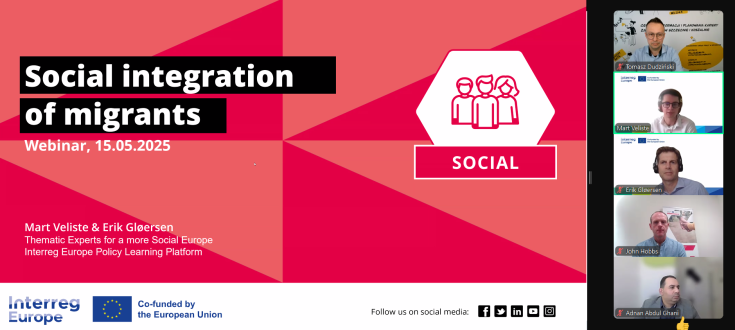SALAM Project: Keynote on Migrant Social Integration

On 15 May 2025, the Interreg Europe Policy Learning Platform hosted a webinar titled "Social Integration of Migrants", gathering policy experts, practitioners, and stakeholders from across Europe to exchange knowledge and showcase successful integration strategies.
At the beginning of the event, the organisers introduced the broader socio-political context of migration in 2025. While Europe continues to grapple with the consequences of the war in Ukraine and persistent instability in the Middle East, local and municipal governments have become increasingly crucial actors in addressing evolving migration trends.
Keynote Highlight: Adnan Abdul Ghani on Child-Centred Integration in Mark Municipality, Västra Götaland County.
The keynote speaker of the event, Adnan Abdul Ghani, Project Manager and Migration Expert at Save the Children Sweden, presented a compelling case study from Mark Municipality, Västra Götaland County. His presentation, titled “Integration strategy in action: Empowering change through co-creation and a child-centred approach”, highlighted a powerful and innovative model of local integration developed under the SALAM project.
The presentation was opened by stressing that effective integration is not the sole task of governments or institutions — it is a shared responsibility. Sustainable and inclusive integration requires meaningful collaboration between public institutions, civil society organisations, and local communities. NGOs bring trust, innovation, and cultural sensitivity, while public authorities ensure the necessary structure, coordination, and rights-based service provision. When these actors work together, they build social trust, close service gaps, and create systems that are more resilient and responsive to migrants’ needs.
The strategy implemented in Mark Municipality aligns closely with the EU Action Plan on Integration and Inclusion 2021–2027. The strategy reflects core principles of the EU framework:
- Inclusion as a two-way process
- Strong cross-sector partnerships
- Targeted support at each stage of integration
- Emphasis on gender equality and anti-discrimination
- Use of digital tools for accessibility and efficiency
- Effective utilisation of EU funding mechanisms
The strategy focuses on four key sectors: education, employment, housing, and health, aiming to build inclusive, sustainable communities where everyone can thrive.
A major strength of the strategy lies in its data-driven approach. Drawing on municipal documents, sustainability reports, and child impact analyses, the project team was able to identify service gaps and design interventions that respond to real needs. This analytical foundation supported a co-creation process that included refugees, local residents, municipal staff, NGOs, civil society organisations, and businesses.
Adnan Abdul Ghani underlined that true inclusion can only be achieved through empowerment and active participation at every stage — from planning to evaluation. The integration strategy in Mark Municipality was co-created with both internal and external stakeholders through:
- Stakeholder mapping and engagement planning
- Internal collaboration across municipal departments
- 35 consultations with external actors including focus groups and interviews
- Establishment of a Co-Creation Committee
- Participatory design processes that ensured a shared vision
This collaborative model not only improved the strategy’s relevance, but also deepened ownership among those involved.
A central pillar of the Mark strategy — is a child-centred approach. Inspired by the UN Convention on the Rights of the Child, the programme prioritises mental health, education, and active participation for young migrants. Particular attention is paid to systemic challenges such as housing segregation and the economic exclusion of migrant women, aligning the work with both EU human rights principles and local realities.
There are four strategic priority areas that guide implementation:
- Participation – Facilitating inclusion through local spaces, events, and cultural engagement
- Empowerment – Supporting early language acquisition, access to education, and entrepreneurship
- Equality – Ensuring migrants receive respectful, non-discriminatory services
- Collaboration – Strengthening partnerships and clearly defining integration goals
These pillars collectively promote social cohesion, mutual understanding, and equitable development.
In addition - during the webinar - good practices were presented by Dr John Hobbs from Munster Technological University in Ireland, who introduced the "Nasc: New Beginnings, Children & Families Project", highlighting tailored support for vulnerable migrant groups. Tomasz Dudziński, Career Advisor at the Regional Labour Office in Szczecin, Poland, shared insights from the "Razem możemy więcej – Together we can do more" initiative, developed under the MILEstone project.
